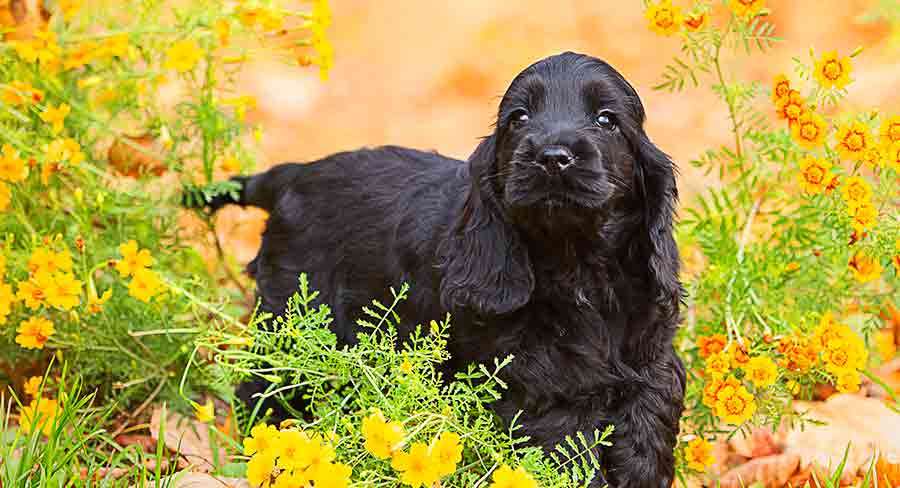
English Cocker Spaniel dogs are confident, loyal, gentle natured, energetic little dogs. They are a small sporting dog breed that comes in two types. Cockers from working lines make good hunting, agility, flyball or obedience partners. English Cocker Spaniels from show lines tend to be more mellow. The trademark flowing ears are shorter in working Cockers, and the coat less profuse.
Both types are healthy, packed with personality and responsive to training, making the English Cocker a great family pet or working companion.
Reaching a height of up to 17 inches tall and less than 35 pounds in weight, these merry pups have a good average lifespan of 13 years. A great first puppy for active new dog owners, we’ll look at how the Cocker’s lively breed characteristics mix with family life. Sharing tips for grooming, training and caring for an English Cocker Spaniel, from puppy to old age.
Contents
- English Cocker Spaniel history
- English Cocker Spaniel size
- What do English Cocker Spaniels look like?
- Grooming, shedding and coat types
- English Cocker Spaniel temperament
- Are English Cocker Spaniels good family pets?
- English Cocker Spaniel puppies for sale
- Adopting an English Cocker Spaniel
The Cocker Spaniel breed is split into two types. Working English Cocker Spaniels power through life and excel at agility and tracking. Show type Cockers are more mellow. Both are smart, easy to train, good with children, and make devoted pets. We’ll be looking at the characteristics and breed traits of both types of English Cocker. We’ll talk about exercise, coat care, and grooming. And give you some great tips for finding and raising the perfect Cocker for your family.
What is an English Cocker Spaniel?
The English Cocker Spaniel is a small sized working dog breed, used for hunting pheasants, grouse, rabbits and other game. They also make fun, friendly, active pet dogs. For active families with plenty of time to give, working and show varieties are good family dogs. Both show and working types take well to positive reward training. Some may bark when excited, or when their needs aren’t being met.
- Popularity: 52nd most popular in USA
- Purpose: Sporting, hunting, pet
- Weight: 26-34 lbs
- Height: 15-17 inches
- Temperament: Clever, energetic, friendly
- Coat type: Silky, medium to long fur
Where Do English Cocker Spaniels Come From?
Originally, the English Cocker Spaniel and the English Springer Spaniel were considered the same breed. But, in the 1870s, they gained separate recognition. ‘Cocker’ comes from ‘Woodcock’. This was one of the game birds that the English Cocker Spaniels would hunt for in the undergrowth.
After the second world war, the popularity of Cockers as working dogs went down. They were all but replaced by the all-purpose Springer Spaniel. But in the 1990s these extraordinary working dogs had a huge surge in popularity. The working Cocker is now seen on shoots around the world. It competes regularly and successfully at field trials.
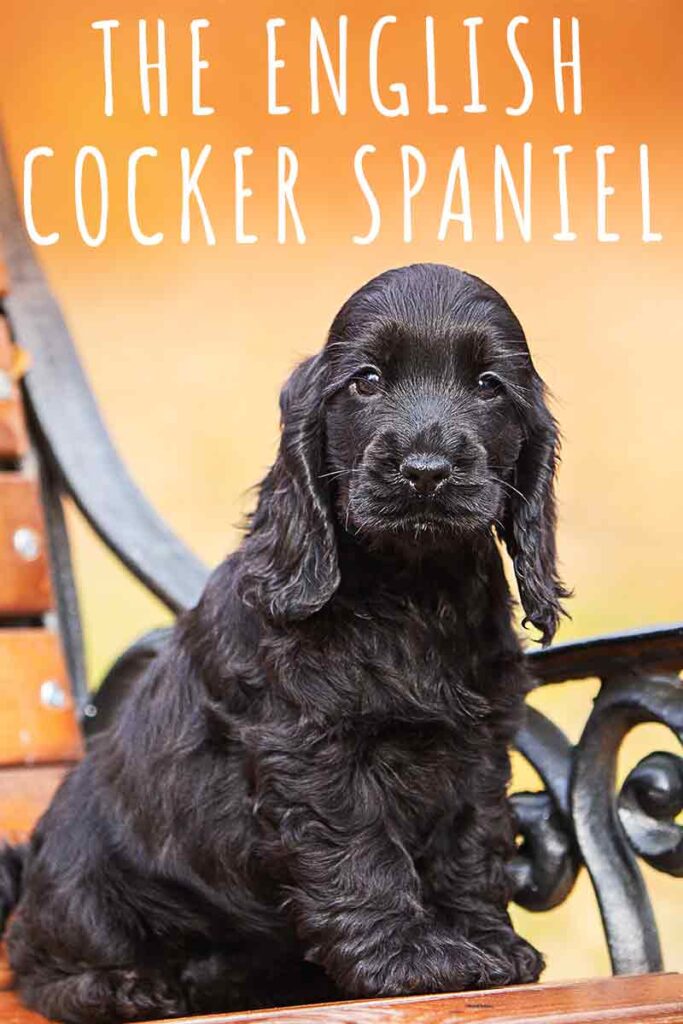
Fun Facts About English Cocker Spaniels
- In the UK, the English Cocker Spaniel is just called the Cocker Spaniel, or Cocker!
- Cockers are one of the smallest members of the sporting group of dogs.
- The main dog, Lady, from Disney’s popular ‘Lady and the Tramp’ is actually an English Cocker Spaniel!
- Prince William and the Duchess of Cambridge, Kate Middleton, were given a cocker spaniel called Lupo as a wedding present by Kate’s brother!
- John F. Kennedy had a cocker called Shannon. Harry S. Truman had a cocker called Feller. And Rutherford B. Hayes had a cocker called Dot!
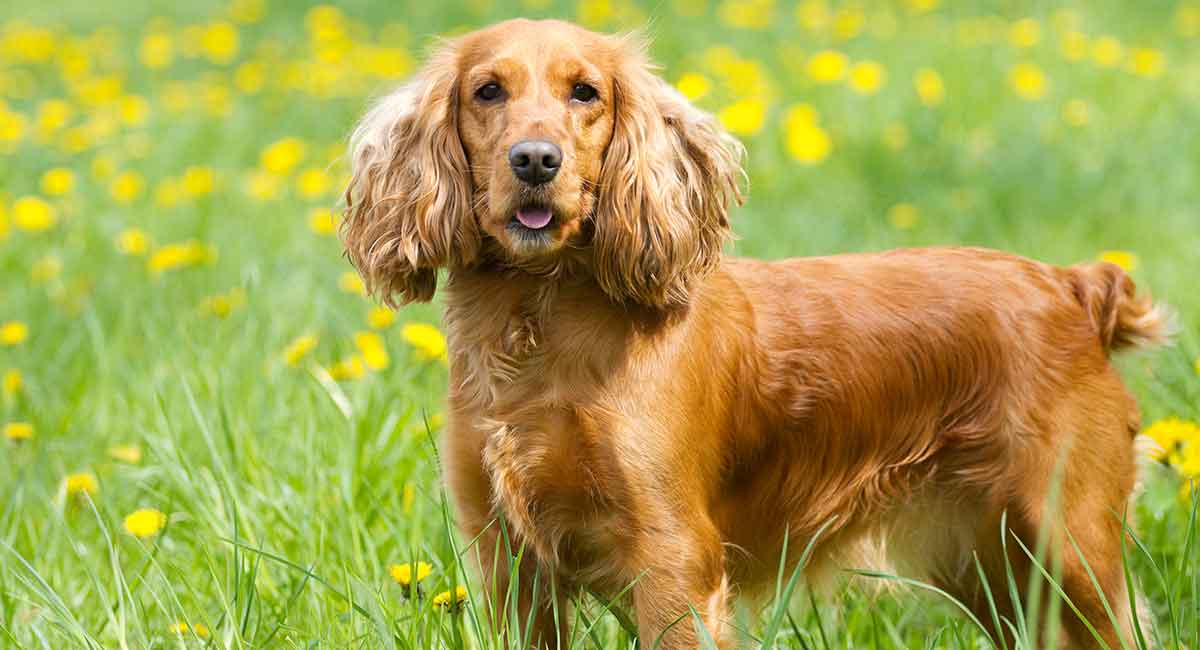
How Big Are English Cocker Spaniels?
The English Cocker Spaniel is a small to medium sized dog. Males are 16 to 17 inches tall and females 15 to 16 inches. Male English Cockers are also a little heavier at 28 to 34 lbs, whereas females are 26 to 32 lbs.
English Cocker Spaniel Appearance, Body Shape and Traits
The English Cocker Spaniel has a square, balanced body with even proportions to its legs and torso. They also have distinctly floppy ears. But, as we mentioned earlier, there are some brief differences between working and show strains.
The English working Cocker Spaniel resembles their ancestors. They are strong, compact little working dogs. Working Cockers have long ears, of medium length, which they can lift up high when alert and listening.
There is arguably more variation in appearance between the field bred English Cocker Spaniel than between their show bred cousins. As this is not the main consideration that breeders will look to when choosing parents for a litter.
The show cocker is often larger and less nimble than his working cousins. He has a high domed forehead and long ears, set very low on the side of his head.
English Cocker Spaniel Coat Type
In general, both Cocker varieties have silky coats. But, there is some difference in their coat types. The working Cocker has tight, bright eyes, and a medium coat with moderate feathering on the legs, chest, and ears. His coat may be slightly wavy or curly, but not excessively long.
Many show Cockers have very profuse long coats, with soft and silky fur. Their forelegs, hind legs and body will all be well feathered.
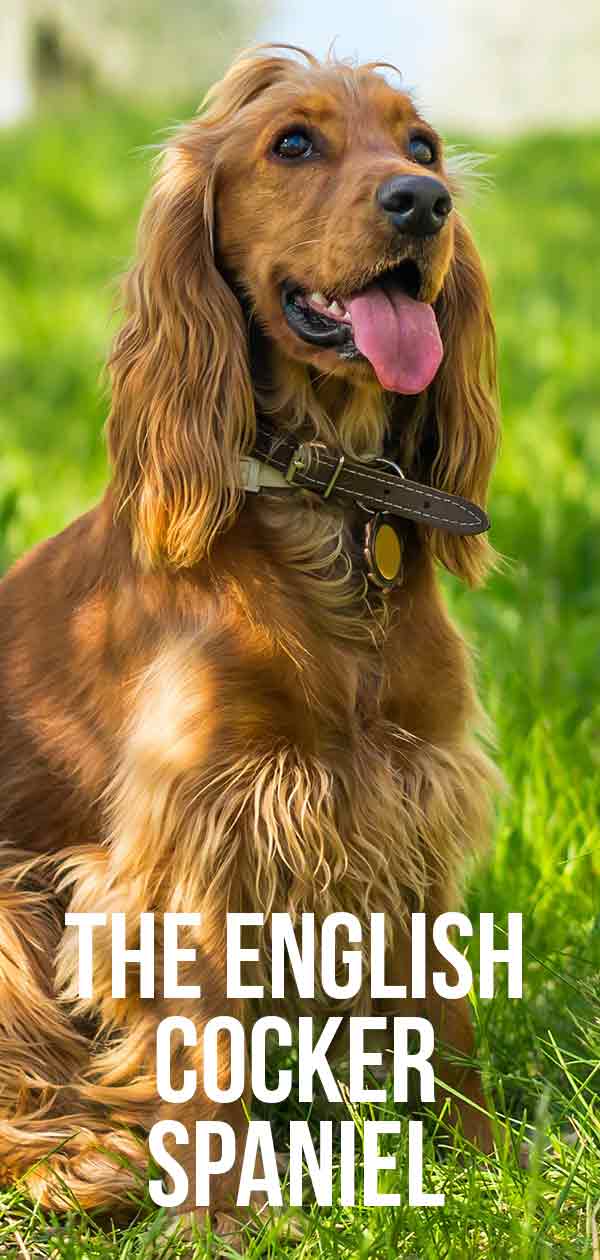
Color Varieties in English Cockers
Both show and working types come in a huge range of colors. This includes:
- Black
- Blue Roan
- Golden
- Lemon Roan
- Liver
- Liver Roan
- Orange Roan
- Red
- Sable
And a huge variety of bi-colors. Including the tan and black English Cocker Spaniel, the tan, white and black English Cocker Spaniel, or the sable and white Cocker! The sky’s the limit for Cocker coat colors.
English Cocker Spaniel Grooming
Whether you decide to bring home a working bred or show bred English Cocker Spaniel, you will need to commit to staying on top of their grooming needs. Grooming twice a week with a wide brush will keep them free of tangles, but you will need to clip their coats two or three times a year to prevent them becoming unruly or getting in their way.
The long ears and profuse coat of the show strain requires more grooming and care than that of their working cousins.
Don’t be tempted to try and use a tight brush like the Furminator on soft cocker spaniel fur. Do use your fingers where possible to tease out knots and burs that get caught in their coat.
When you bring your new Cocker Spaniel puppy home, get him used to being brushed regularly from that first week. Even though he won’t need grooming straight away before his coat has grown in properly, grooming will help him to become familiar with the process.
Keep the grooming process fun and positive with lots of affection and treats. You will then find grooming easier and more enjoyable as your dog grows up.
English Cocker Spaniel Shedding
Like most sporting dogs, English Cocker Spaniels will shed. But, they aren’t the worst working breed when it comes to shedding. Generally, you can expect your English Cocker Spaniel to shed moderately. They may shed more seasonally.
But, as long as you groom them properly, it should be easy to keep on top of. Show cockers will slow down more than working cockers, but they will still be lively little dogs.
Are English Cocker Spaniels Hypoallergenic?
As a high shedding breed, the English Cocker is sadly not the best choice for a home with humans that have dog allergies. They aren’t hypoallergenic dogs.
English Cocker Spaniel Temperament
Just like with their appearance, there is a difference between working and show cockers when it comes to temperament. Knowing this difference can help you decide which one will best suit your home.
If you are active and busy, always on the go, you will probably find the Working Cocker Spaniel temperament more appealing. If you have less time to dedicate to training and stimulation at the moment, then a show Cocker Spaniel will probably hold greater attraction.
But both working and show bred Cockers are usually devoted dogs, loyal to their family and keen for human attention. They are loving little dogs across the board, who will show affection liberally.
Working English Cocker Temperament
All cocker spaniels are lively little dogs. But, the working bred cocker is normally more enthusiastic than his show bred cousin. He has an enormous stamina for staying up and at ‘em all day long. Working bred Cockers tend to stay alert even after a fairly busy morning.
They require more stimulation, and are better suited to a more active home. They are also more likely to have a huge hunting drive and good retrieving instincts.
Show English Cocker Temperament
Some (but not all) show Cockers have lost much of their hunting ‘drive’. This can make them easier to train with the basic commands, as they are not being constantly distracted by the potential for adventure in the undergrowth.
In general, show Cocker Spaniels do tend to be more placid and less energetic little dogs. A show bred variety will probably be happier to lie down next to you after a good long walk and relax.
Separation Anxiety in English Cocker Spaniels
English Cocker Spaniels are strongly bonded to their family. So, they can display behaviors associated with separation anxiety if left alone for long periods of time.
Chewing, barking and destruction of your property could be a result of inadequate company at home. This breed won’t suit a life where it is left alone for long periods. They need a family that can spend plenty of time with them.
English Cocker Spaniel Prey Drive
One thing to be aware of with the English Cocker Spaniel is their natural instincts. Although this is more likely to be an issue with working Cockers than show Cockers.
Almost all Cocker Spaniels are affectionate dogs, without guarding instincts or suspicion. But both breeds show strong prey drives. When they see smaller animals, they may tend to chase after them.
This can mean they aren’t the best dogs for families with other small animals. Especially when it comes to the working Cocker. Outdoors, the working Cocker is transformed into a hunting machine. He craves scent, and follows it wherever it takes him, nose glued to the ground.
From day one of walking with your working bred Cocker Spaniel, he will need supervision and management outdoors. This will help you to ensure that he does not develop a habit of hunting further and further away from their owners, and getting himself into trouble.
Show Varieties Are Less Prone to This
Show Cockers tend to be less inclined to this behavior.
So if you are looking for a calmer friend, one happy to trot along at your heels on a walk, rather than find every rabbit in the county and chase him from his bramble bush, then a show bred Cocker may be more to your taste.
But he will still require training and a watchful eye, as the instincts are still there, albeit buried deeper!
English Cocker Spaniel Barking
Barking is a learned behavior to some extent. But it does seem to have a genetic component. If your pup’s mother is very vocal, then there is a likelihood that your puppy will be the same.
Barking is not a desired trait in Cocker Spaniels, but some working strains will be more likely to yap when excited than others. If you are concerned about noise, then choosing a quiet pup from a quiet parent will increase your chances of having a less noisy home!
Training and Exercising Your English Cocker Spaniel
Both types of Cocker are clever and people-oriented. So, they will take to training well. You should start training as young as possible and remain consistent. But, because of the slightly strong natural instincts, the working variety will need more training.
Both types have prey drives. But owners of the working strain in particular must work to get a great recall command established.
Show Cockers are intelligent dogs that still need a high level of training. But they may be prone to injury when romping through the undergrowth due to their full tail and loose skin around the eye. So, be aware of this when training and exercising a show Cocker outside.
Socialization
As well as training, socialization should be started as early as possible. Socialization can help your English Cocker Spaniel be as happy as the breed is known for being, in every new situation.
Studies have proven that socialization from an early age can also help to reduce behavioral problems in older dogs. So, it’s important to introduce your Cocker puppy to as many new experiences as possible.
English Cocker Spaniel Exercise Needs
Both working and show Cocker Spaniels need daily exercise. This could be in the form of energetic fetching games in the garden, or a good long walk in the countryside. This high energy level, combined with the extreme agility of these action packed little dogs, means they make great sporting companions.
It can also make them stressful walking companions if you are looking for a dog to accompany you with an elderly relative or small child, who find it hard to keep up or need a fair amount of your attention. But if you are keen on getting involved in a sporting activity with your dog, working cockers excel at agility, flyable, tracking and gundog work.
There is still some variation between types, but not a huge amount. The working Cocker is a tiny powerhouse of activity. He is always busy, both outdoors and in. This strain is intensely happy and affectionate but they are rarely still.
English Cocker Spaniel Health and Care
In general English Cocker Spaniels are a healthy breed of dog. But, they are prone to some health problems, which you need to be aware of before you choose your new puppy. English Cocker Spaniel health risks to be aware of:
| Brain: | Adult onset neuropathy |
| Eyes: | Loose eyelids, Ectropion, Progressive Retinal Atrophy, glaucoma |
| Joints: | Hip dysplasia, patellar luxation |
| Other: | Mammary cancer, pyometra, ear infections, Familial Nephropathy |
Adult Onset Neuropathy
This is a neurological disease that may start to show up later in your dog’s life, typically after 7 years old. It usually starts with hind leg weakness, but other symptoms can include wobbly gait, angled hocks, and a wide-based stance. Testing is available for this disorder before breeding dogs.
Loose Eyelids
Some show cockers suffer from loose eyelids, due to excess skin on the face. This can be problematic when your Cocker is exercising outside, as the loose skin around their eyelids can get caught on undergrowth. This means your Cocker is more prone to injury, which could lead to eye infections.
Ectropion
Show bred Cockers may suffer from ectropion. This is a condition where the eyelid droops and exposes the eye. It can be treated medicinally or in extreme cases with surgery.
When you pick your show Cocker puppy, take a look at the mother and father’s eyes and ask the breeder whether they have had to treat them for the condition.
If either of the parents has had correctional surgery, the chances of your puppy having the same are increased. You should find a breeder whose dogs have the best eye health, to give your pup the greatest chance of good eye health of his own.
Progressive Retinal Atrophy
All types of Cocker Spaniel may suffer from Progressive Retinal Atrophy, a genetic disease that affects numerous dog breeds.
PRA leads to blindness, so it is important to only pick a puppy from a litter with parents that have been tested as clear from the disease. This will hugely reduce the chances of your puppy developing this condition.
Glaucoma
Another eye issue to be aware of is glaucoma. There are two types of glaucoma that can affect dogs: primary glaucoma and secondary glaucoma.
Signs of glaucoma can include watery discharge around the eye, swelling or bulging of the eyeball, and a change in color in the cornea. If left untreated, this condition can lead to blindness.
Hip Dysplasia
Hip dysplasia is a common genetic disorder in dogs. It is a malformation of the hip joint that can cause pain and problems walking. Depending upon the severity of this condition, your puppy will either need pain medication, surgery, or in extreme cases euthanasia.
Buying your pup from hip scored parents with good hip scores will reduce the chances of your puppy suffering. But, at present not many breeders are scoring their parents so you will need to choose carefully and decide whether you are happy to run the risks.
Patellar Luxation
Another joint problem that can impact Cocker Spaniels is patellar luxation. This is more common in small breeds. This health issue is also known as dislocating kneecap. Signs of luxating patella in dogs includes: limping, keeping weight off a single leg, reluctance to move or walk.
Mammary Cancer
Cocker Spaniels are more susceptible to mammary cancer. This is a much more common problem in female Cockers, but is possible in rare cases for males. Attend regular veterinary trips to ensure your Cocker is not suffering from tumors.
Pyometra
The English Cocker Spaniel is also more prone to pyometra than most other breeds. Pyometra is a scary condition where the uterus or womb of the female dog becomes infected, inflamed and filled with pus!
It is not easy to detect, potentially hazardous to treat and can result in death. So, you may need to spay your female cocker to protect her long term health. You should speak to your veterinarian about the pros and cons of spaying. But, the risk of issues like mammary tumors and pyometra are higher in female Cockers that aren’t spayed.
Ear Infections
Cockers are prone to ear problems, like all floppy eared dogs. This will be more likely in show bred cockers who have very long ears, but is still a risk in the working strains. You will need to keep an eye on your puppy’s ear health by regularly checking them and cleaning his ears if necessary.
Fortunately, there are usually clear signs if your dog is troubled by an ear condition. He will shake his head, paw at it or rub it along the ground. If your pup displays any of these symptoms, then you can pop him down the vet who will be able to give you appropriate ear cleaner or medication to help.
Familial Nephropathy
A final genetic disease that English Cocker Spaniel owners should be aware of is Familial Nephropathy. This is a kidney disease that usually occurs in young dogs, and can be fatal. Signs include loss of appetite, excessive thirst and urination, poor coat quality, and more.
General Care
English Cocker Spaniel dogs will lead energetic lives, so should have a food tailored to their lifestyle. Make sure you trim their nails regularly. This will stop them suffering from broken or split nails when exercising. Make sure that you also take care to clean your Cocker’s teeth.
And, check their ears regularly for any build ups of wax. English Cocker Spaniel dogs are prone to ear infections, so this is particularly important.
English Cocker Spaniel Lifespan
Despite the potential issues with health testing, it has to be said that English Cocker Spaniels are generally healthy little dogs. They have a good average lifespan of twelve to fourteen years, and have been known to live a few years longer than this if unaffected by genetic diseases.
Picking a puppy from a breeder who has carried out all of the relevant health tests, and has lines of dogs who are known for their longevity will all help your puppy have the best chance of living a long and happy life with you.
Pros And Cons of Getting An English Cocker Spaniel
| Pros | Cons |
| Intelligent and take well to training | They need a lot of exercise |
| Really friendly dogs, especially when well socialized | Can display destructive behaviors if unsupervised |
| Very family-oriented dogs | Moderately high grooming requirements |
| Generally healthy when looked after properly | Can be quite vocal dogs |
Do English Cocker Spaniels Make Good Family Pets?
In the right homes, both working bred and show bred English Cocker Spaniels make great pets. To be the right home for any English Cocker Spaniel you will need to be fairly active and committed to training them when they are young.
You will also need to be prepared to groom him regularly. Make sure you’re prepared for a dog who may be quite vocal, and will want to follow you everywhere.
Both working and show Cockers are really friendly dogs, so will do well with big families that can give them lots of attention. However, because of their stronger prey drives, working Cockers may not do as well in homes with smaller pets.
Working vs Show English Cocker Spaniels
For an active family that has the time and energy to devote to training and who are committed to supervising and engaging with their dog outdoors, the wonderful Cocker Spaniel is a great choice.
If you want to try out activities like flyable, gundog training or agility then a working English Cocker Spaniel might be your preference. But, if you want a slightly calmer companion, or to try your hand at ring craft, then a show bred cocker will probably be your preference.
Rescuing an English Cocker Spaniel
Choosing a rescue dog is a good way to give an English Cocker Spaniel a second chance at a loving home.
Adopting a dog from a rescue is a good way to know a little more about your pup before you bring it home. You should be able to find out more about its temperament, and health history.
Rescue centers will often interview you before you can take your chosen dog home.
Here are some links to get you started in your search.
| USA | Cocker Nation Rescue Michigan Cocker and English Springer Spaniel Rescue The Cocker Spaniel Club |
| UK | Spaniel Assist Spaniel Aid |
| Canada | Canadian Cocker Spaniel Rescue |
If you know any other great English Cocker Spaniel Rescues, let us know their names in the comments below, so we can add them to this list!
Finding an English Cocker Spaniel Puppy
When you visit your potential puppy, make sure you meet his mother. She should be clearly happy to see you, with a wagging tail and no signs of seeming shy or suspicious towards you.
They might well be bouncy and racy around, and will possibly bark a little.
But as we looked at earlier, choosing a pup with quieter parents can help curb barking in adult dogs.
Ask to see the medical history of your pup. If your breeder doesn’t have this, you should try to find a pup that does.
Good English Cocker Spaniel Breeders
Health testing is only just becoming popular in breeders of working strain Cockers. So, you may still find it hard to buy a working English Cocker Spaniel puppy whose parents have been put through all the relevant tests.
There is a lot of misinformation within the working gundog community as to the prevalence of some Cocker health conditions and a misconception that working Cockers are somehow unaffected.
This is not true, but old beliefs die hard. So, you may still find very well bred Cocker pups out of champion stock, that have not been tested at all.
If a puppy has not been health tested, the sensible thing to do is to walk away and find one which has. Cockers are a popular breed and many litters are responsibly bred each year.
Bad English Cocker Spaniel Breeders
Make sure to avoid puppy mills. These usually produce puppies without concern for the quality of their health. Puppies and their parents in puppy mills often aren’t kept in good conditions, and aren’t socialized or cared for as well as they should be.
Pet stores often buy their puppies from puppy mills, so both of these places should be avoided. If you want any more help with choosing a puppy, check out our Puppy Search Guide.
English Cocker Spaniel Price
Your cocker puppy will cost you around $1000 – $4000 to buy. Prices will vary depending on location, pedigree, and demand. But there are extra costs in raising and caring for puppies.
Factor in insurance, feeding, routine medicines like wormers and a whole lot of your own time.
If you are happy that you have the money and time for a dog, and that your family are also keen for a new furry member of the family, then a Cocker Spaniel could be an excellent choice.
Raising an English Cocker Spaniel Puppy
Caring for a vulnerable Cocker puppy is a big responsibility. There are some great guides to help you with all aspects of puppy care and training.
Popular English Cocker Spaniel Breed Mixes
If you’re not sure this breed is the one for you, you could also try looking at English Cocker Spaniel breed mixes.
These can be a great way to get the best qualities of two dogs in one!
Take a look at some of our English Cocker Spaniel mixed-breed guides:
- Cockapoo
- Beagle Cocker Spaniel Mix
- Cockalier
Want to compare the English Cocker Spaniel to other breeds
Comparing the English Cocker Spaniel With Other Breeds
If you’re looking for direct comparisons between the Cocker and some other breeds, take a look at our breed comparison guides.
There are plenty of other similar breeds you may also want to consider.
Similar Breeds
If you’re not sure you’ll be able to provide the best home for an English Cocker Spaniel, you might want to check out some similar breeds.
Here are some breeds with some similar lovable qualities.
Are you getting ready to bring a puppy home?
English Cocker Spaniel Products and Accessories
If you’ve decided which Cocker variety will suit you best, now you’ll need to prepare for their arrival home!
Your English Cocker Spaniel
The English Cocker Spaniel is a small but personality-packed pup. It has gained wide popularity around the world.
Whether you choose the more active working variety, or the slightly more chilled show type, both can make a wonderful family dog in the right home.
What do you think of the English Cocker Spaniel?
References And Resources
- Gough et al. ‘Breed Predispositions to Disease In Dogs and Cats’, Wiley Blackwell (2018)
- O’Neill et al. ‘Longevity and Mortality of Dogs Owned In England’, The Veterinary Journal (2013)
- Schalamon et al. ‘Analysis of Dog Bites In Children Who Are Younger Than 17 Years’, Pediatrics (2006)
- Duffy et al. ‘Breed Differences in Canine Aggression’, Applied Animal Behavior Science (2008)
- Adams et al. ‘Results of a Survey of UK Purebred Dogs’, Journal of Small Animal Practice (2010)
- Farrell et al. ‘The Challenges of Pedigree Dog Health: Approaches to Combating Inherited Disease’, Canine Genetics and Epidemiology (2015)
- Oberbauer et al. ‘Ten Inherited Disorders in Purebred Dogs by Functional Breed Groupings’, Canine Genetics and Epidemiology (2015)
- Presidential Pet Museum
- ‘H396 Adult Onset Neuropathy (AON) (Service Lab)’, Combi Breed: Genetics in Practice
- Hunter, T. ‘Glaucoma in Dogs’, VCA Hospitals
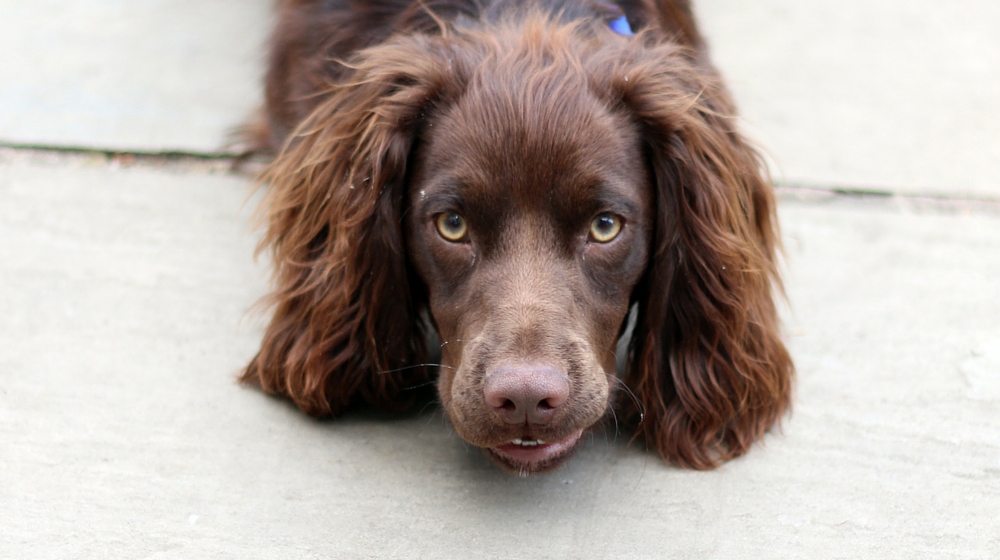
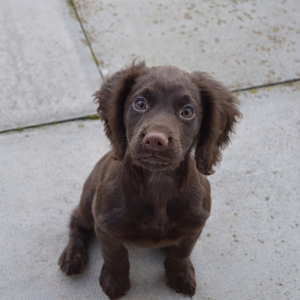
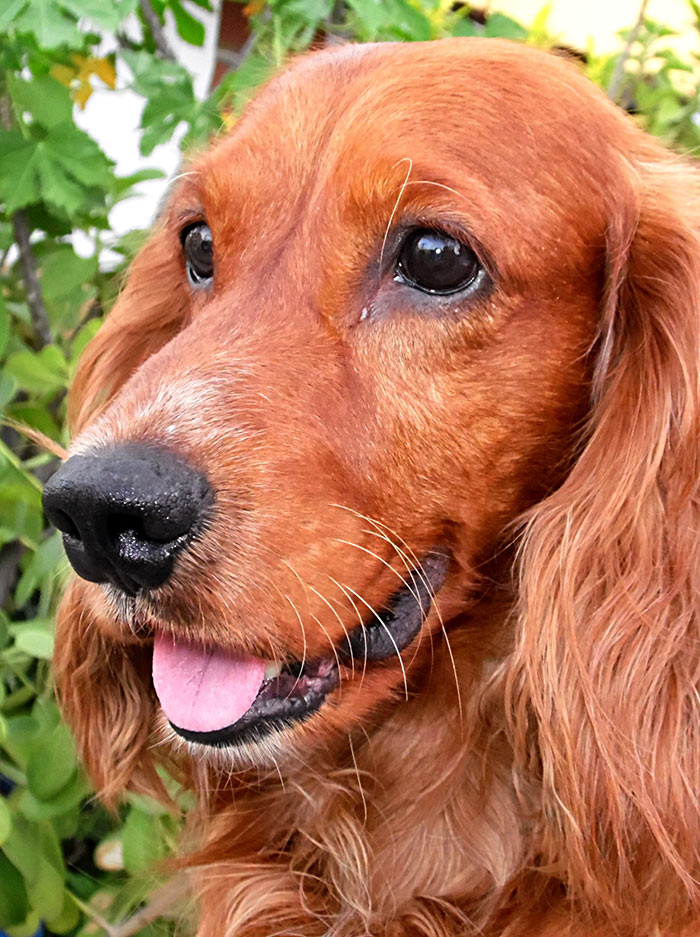
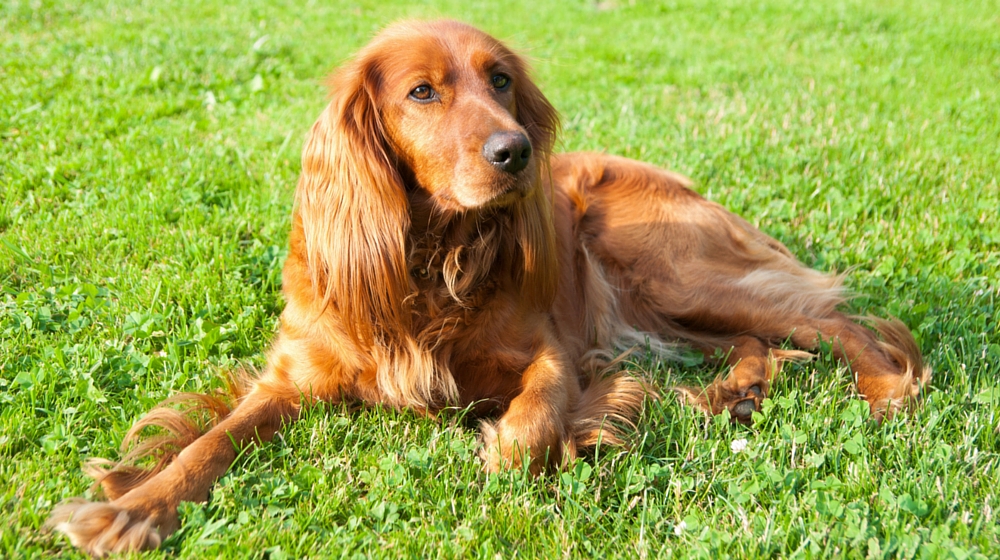
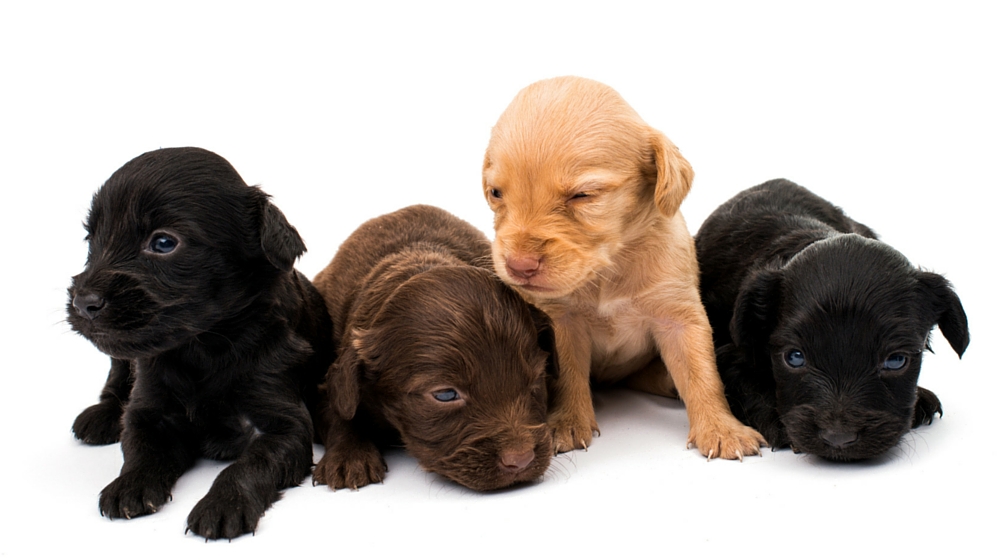

Alison Ronald says
Our Blue Roan Cocker Spaniel was doing very well – sleeping at night and behaving very well when she was out and in cafes. Two weeks ago she decided not to settle at night – barks, wails and howls when she is put to bed and barks all the time she is in cafes. We visited the Local Vet who said she had a bowel upset and she has been on medication since then. In the meantime she has improved in this respect but the behaviour she has been displaying has continued. We are quite concerned about the change in her and more than a little stressed. Maybe the lack of sleep is a contributing factor. Can you help please? Alison Ronald
PS puppy is nearly eight months old.
Robert says
I am looking forward to buying a cocker spaniel puppy I hope to find one soon
Linda says
I’m looking for a cocker spaniel puppy, I also hope to find 1 soon Linda
Mel Blacke says
I have a two year old bench bred ECS from a hobby breeder here in the States and I have to say that this is a cool little dog. She is extremely bright with good focus and learns SO quickly. She requires a lot of time and attention, however—but I am okay with that. She is so quirky and her hijinks make me laugh at least once a day. She requires quite a bit of exercise and mental stimulation but I got her to be a companion dog and since I like to spend time outside, it worked out really well for us. I challenge the notion that the bench bred dogs have lost their hunt drive, however. She will retrieve with the devotion of any Lab and has proven herself an apt student in obedience. As an experiment, I bought pheasant wings, put her in a sit stay, hid them in the brush in the woods and sent her in to find them. She retrieved nearly perfectly….just like she knew what it was all about. Again, I have to say that this is a very neat breed of dog.
Amanda says
I’ve had my ECS for almost a year now and he is amazing. I love the quirkiness and the hilarious things that he does. He brings the house to life and I can’t imagine not having him.
I have noticed that he doesn’t cope too well with being home alone for extended amounts of time, so we got him into a dog walking group and he seems to love it.
He does get bored easily so we are constantly teaching him new tricks and building on the ones that he already knows.
He is great with other dogs although when he was younger he was very sensitive to any new things. But now he plays with the other dogs and his energy never seems to stop! He plays a lot like a Labor. <3
connie says
I just brought home my 2nd ECS (liver/field) and Im so happy to have this little sport! I dont think I will ever be able to live without one. Plus they are rare in the USA, so very expensive. And there arent any in rescue, because no one gives them up!
OMG….. their energy is hilarious and so high. They run faster than their feet can carry them. And levitate off the ground. My boy is a young adult with OK hips, not excellent, so they took him out of the breeding line. And I bi-passed the puppy time.
When people ask me about these little powerhouses, I tell them they are more like Border Collies than spaniels. If you want to do agility, rally, hunting and love training dogs- go ahead and get one. My last one was so good in obedience I used him to herd the geese at my farm- via hand commands only
If you want a friend and snuggle buddy get the ACS.
I happen to have both and they are both active and fun on the farm, but the ECS is ALWAYS looking to me for something to do while the ACS is sleeping sweetly in her basket by the fireplace. Both wonderful dogs.
But the field ECS is not for everyone.
Amanda says
I also have an ECS who is very energetic. I have him with me at the stables everyday so he gets plenty of exercise. But I have noticed that the do not lots of mental stimulation too.
Amanda says
I meant that they do need lots of mental stimulation too. hahaha
Tim Westerdahl says
where can i find a english cocker spaniel puppy?
Pippa says
What region are you in Tim?
Jessica says
How long is an English cocker spaniel considered a puppy
Lucy says
Hi Jessica, Take a look at this article. The ‘When Will My Puppy Be An Adult’ section gives you the answers: https://thehappypuppysite.com/puppy-development-stages/
Jose Pedro Lucchesi says
Today, it’s been 4 months since I lost my cocker Lily, given a cardiac arrest. She was taking medicine as a cardial for the arrhythmia at 2 years already. She died on 05/17 and you know what? Almost a month after turning 18. Yes on April 19 of this year she was of age and I do not know what it is to have an adult cocker, because Lily, even in the final moments fighting against her disease, never stopped moving her tail and turning on her back and running end slowly behind your tennis ball.